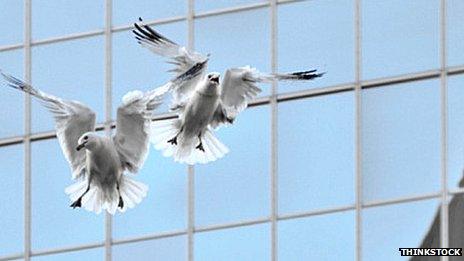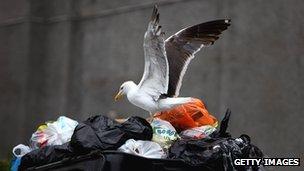Who What Why: Why are there so many seagulls in cities?
- Published

Love them or loathe them, seagulls are as much a part of the seaside as a bucket and spade and ice cream. But why are so many seagulls increasingly found in inland towns and cities?
Traditionally, the birds have lived around water, some inland by rivers and reservoirs. But their high-pitched call is now increasingly being heard in towns and cities far from the coast and many have given up living near water entirely.
Experts say the number of urban seagulls is increasing because nesting on the roofs of office blocks and houses means they can avoid predators such as foxes and, as a result, more chicks survive.
It is also argued food waste in landfill sites and discarded on urban streets provides a ready supply of meals for them.
"Seagulls are extremely adaptable, quick thinking and bold," says Grahame Madge, a spokesman for the RSPB. "From a gull's perspective cities provide myriad opportunities.
"As traditional food sources are declining they have learned to forage in landfill sites further inland and on urban streets. They are taking advantage of our wastefulness.
"Seagulls are breaking their connection with the sea. They have previously nested in towns and cities that are on a corridor to the sea, but now we are seeing them in inland counties that are far from the coast."
Rural and urban gulls are now two distinct populations and don't often mix, says urban gull expert Peter Rock. Rural gulls will rarely start nesting in urban areas and vice versa. Most remain in the environment they were born in, although a small number do return to the coast to breed.
"There is a raft of differences between the two groups," he says. "Most significantly, rural gulls are in massive decline while the number of urban gulls is rapidly increasing and expected to continue going up."
He estimates there are 100,000 pairs of breeding urban gulls on rooftops around town and cities across the nation. In contrast, the number of rural gulls in the UK have declined significantly in recent decades, according to the RSPB.
According to bird experts, there is technically no such thing as a seagull. There are, in fact, several different species of gull, mainly herring gulls and black-backed gulls in the UK.
Since the 1970s, the number of herring gulls has more than halved. A seabird survey in 1969/70 found 343,586 nesting pairs, by the last survey in 2000 it had fallen to 149,177.
In 2009 the herring gull was added to the Red List of Birds of Conservation Concern, external, which is drawn up by a group of charities and conservation organisations. Red is the highest conservation priority, with urgent action deemed to be needed to protect the species.
One of the main reasons for the falling numbers is that changes to fishing practices in the UK have resulted in food shortages for rural gulls, says Rock. Disease is another factor, according to the RSPB. But Rock argues that these two things do not fully explain the rise in urban gulls and says more research needs to be done.
Millions of pounds a year are wasted trying to control them, he says, and only proper research will be able to come up with good management strategies.
Gulls have a reputation for being aggressive, particularly in spring and summer when they breed and raise their young. But experts say they are fascinating birds.

Food waste attracts gulls in cities
"I admit they do not make particularly good neighbours," says Madge. "But they are such interesting, beautiful birds."
They are very intelligent, especially urban gulls, which is a problem for local authorities trying to control their numbers by making food waste more difficult to get at - for example, by using wheelie-bins.
"They are very crafty and very clever in bird terms," says Rock. "They just adapt to everything that is thrown at them. We have invited them into towns with our throwaway society and it is going to cost a lot of money to take them away again."